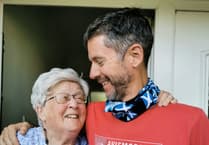“It was like we were going to be driving over a cliff…”
Even 30 years on, the moment he realised the dream was over still has an emotional effect on Rick Buckler.
As the drummer in The Jam he was part of the biggest band of their generation – a band at the peak of their powers when frontman Paul Weller decided to pull the plug after five years of success.
Rick, Paul and bass player Bruce Foxton had formed the band in Woking in the mid ‘70s and then risen to fame at the time of punk. By 1982 they had enjoyed a string of number one singles, toured arenas throughout the world, and had the music press hanging on their every word.
But unbeknown to the others, Weller had had enough and decided to call it a day.
Rick remembers that he suspected something was wrong when he was told to attend a band meeting in the summer of 1982.
“We never had band meetings, so I thought ‘Where’s this coming from’,” he said.
“We were in a recording studio to do some b-sides. We sat down at a coffee table – me, Bruce, Paul and Paul’s dad John, who was our manager – and it was almost like John couldn’t get the words out. I’m sure he didn’t want the band to finish.
“He had to speak for Paul, Paul didn’t really say anything. Anyway, John said that was it, Paul was going to leave the band and we - especially Bruce - tried to say ‘Why don’t we just put it on hold for six months and anybody can go and do their solo project and see how we feel?’ It just seemed so sudden, there didn’t seem to be any logic to it.”
Massive
Rick continues: “I didn’t really take it in at first. This was June or July but we had six months of commitments in front of us. We had a massive tour which was going to finish at Guildford but then we added a final gig at Brighton (on December 11, 1982).
“It was like we were going to be driving over a cliff at the end of the year, and you keep thinking ‘Maybe he’ll change his mind’.”
For the drummer, who still lives in West End today, the end came way too soon as the band were playing better than ever.
“As a band we were really tight at that time – even if something went wrong no-one would have noticed because we were so used to playing with each other we’d get round it.
“It also came as a shock because everything that we worked for had come true and we thought we’ve finally got to the point where we don’t have to worry about winning audiences over. We’ve done all the graft, the sound of the band was really what we wanted, touring had become relatively comfortable because we had decent hotels and decent transport.
“We’d done all the travelling round in the most difficult circumstances and staying in terrible hotels. We’d got through all of that. Then Paul said that’s it… It was such a huge part of all of our lives.”
Despite his hopes, The Jam played that final gig at the Brighton Centre and then went their separate ways.
Rick remembers: “After the last show I just went home and sat there. I couldn’t think what to do, it was hard. It’s like losing your job, I thought what am I going to do now? It seemed a little surreal.
“I went through a normal Christmas and in the new year decided I’ll start another band.”
He formed Time UK, later drummed with The Highliners, formed The Gift and then returned to playing Jam songs with Foxton in an outfit called From The Jam. Despite some success, he was never to return to the glory days of the early ‘80s.
Of course, the silver lining of splitting up The Jam at the height of their success means their heritage is unsullied – they never entered the downward spiral that afflicts so many bands late in their career.
“I’m very proud of the fact that on each one of our albums we moved on – and they’re all terrific,” he said. “It was a fabulous time and we never hit that downhill slope and we never rested on our laurels.
“The only regret now is that myself and Bruce felt there was at least another couple of decent albums in The Jam. We’d always explored things like having brass players, making the sound bigger and so on.
Abandon
“Looking back over them, I’m not that keen on In The City but I like a lot of stuff on This Is The Modern World. I hadn’t listened to it for years but I heard Life From A Window the other day and it’s fabulous – I had forgotten how good that was.
“I love them all but actually there’s an album called Live Jam which I think I love most because that’s how I remember the band.”
In recent years, he says he has come to realise why Paul made his momentous decision to abandon the band.
“As soon as we signed to Polydor records in 1977 they just wanted us to work and we were suckers for it,” said Rick.
“The record company set the pace and it just became this huge machine that never stopped. Those five years from 1977 to 1982 were just full on.
"I don’t think we had any real time off to speak of, putting the brakes on just wasn’t thought about.
“Paul was expected to write to order, we had deadlines to fulfil – once we had an album out we had to go on the road.
“The more successful it became the more people wanted stuff. Nobody had the strength to say ‘No let’s take time out’. In the end it just broke…
“Myself and Bruce have realised this looking back on it, but only with hindsight. At the time we were quite happy to go out there and play. What we lost control of was the business side of it. If you signed this contract to produce product and play in all these countries, you have to fulfil it.
“But for me it was all high points. It was an upward progression all the way, which was fabulous really.
“There were benchmarks like chart positions and how big the tours and venues were but to us they were still just gigs and our records.
“We ran with a continual six-month schedule in front of us. This is when the album comes out, this is for the single, the tours were organised in advance. There never seemed to be an end to it, which was what we wanted.”
But, although he now understands Weller’s decision, he feels it might have been better to take a break and then push The Jam on to even greater heights.
“Paul said he felt he was on a treadmill to fulfil contractual obligations and I perfectly understand that. The demand was on him as the main songwriter to constantly come up with product.
“It’s almost unbelievable now because we should have taken control of it.
“But one thing I found hard to understand was when I found out that back in the summer - not long after he told us he wanted to leave - he had re-signed another contract with Polydor. He’d jumped out of one frying pan straight into another.
“I suppose that was his way of taking control…”
Another thing that slightly sours Rick’s memories of The Jam is that he has not spoken with Weller for almost 30 years.
“Over the years I’ve managed to stay in touch with Bruce one way or another. But after he left Paul didn’t want to know, no matter how much we tried to contact him.
“He had an impenetrable barrier around him. In ’83 and ’84 myself and Bruce made a lot of attempts to meet up just for a coffee or something but he wouldn’t.
Memories
“When I was in Time UK I was driving by his studio and I went in to say hello but he wouldn’t come out. After a while you get fed up and think maybe I should take a hint.
“Last time we spoke was in 1983. I bumped into him at Hammersmith Odeon – we were both there to see a gig. He said hello and then walked off and I haven’t seen him since.”
But Rick still has very fond memories – especially of the early days in Woking when the band formed at Sheerwater School and started playing covers in local pubs and workingmen’s clubs.
“I first started playing music just mucking around with friends,” he recalls. “My twin brother Peter was a bass player but we never got out of the rehearsal room.
“Later I got together with Paul and Steve Brookes when we were at Sheerwater School. A guy called Neil Harris was the drummer but he was more of a jazz drummer and wasn’t that keen, so I stood in.
“We started playing workingmen’s clubs and anywhere we could. We were a club band doing covers at weekends and the money wasn’t great. I was about 18 or 19 then.
“I kept getting sacked from jobs because I would turn up late on Monday mornings and leave early on Fridays. Sometimes I just used to leave. I worked in a drawing office, I was an inspector at an electronics company, anything I could get my hands on – I wasn’t very career-minded.”
The band started earning decent money playing covers in places like Michael’s club I Woking, Woking Working Men’s Club, Woking Liberal Club, and Sheerwater Community Centre, but he says: “We were fed up with playing to people who weren’t there for us.
“Then we started playing what was the pub rock scene in London, playing pubs like the Greyhound in Fulham along with bands like The Kursal Flyers, Bees Make Honey and The 101ers, which was Joe Strummer’s band before The Clash.
“It was a good scene. But there were problems – a lot of venues would book two bands because they couldn’t afford not to have a live act on, so the first one to turn up got the gig. We turned up one night and The 101ers were playing.
“We got paid about £5 or £10 between us for those gigs but we’d get £25 a night playing the working men’s clubs. We once played at Chelsea Football Club – I can’t remember why but there was some link with Woking FC.”
The press started getting interested in the pub rock scene, especially when Dr Feelgood started selling plenty of records – but things took a real upward turn with the advent of punk.
“When the Sex Pistols came along and started getting loads of attention, the press and record companies started looking at other bands,” says Rick.
Although The Jam were always slightly separate from the punk scene, Rick says the Pistols were an inspiration.
“It was great to see them because for the first time there was a band the same age as us playing to an audience the same age as us. We had grown up with megabands like Deep Purple, that prog rock thing – plus there was a huge divide between street level music and what you saw on Top of the Pops.
“To find there was a stepping stone was great for our morale. We decided we’d stick with that and drop the working men’s clubs.”
He also recalls one early gig supporting the Pistols.
“The Sex Pistols rang us and said they’d just been signed by EMI and had to do a warm-up show in Dunstable. They said if you can get there and support us we’ll pay you £10, so we got in the van and went. It was about a 1,500-seater and there were about 12 people there…
“They still went out and did it and were great.”
Driving to Dunstable to play to 12 people was not unusual for The Jam either.
“We were playing loads of gigs,” said Rick. “If somebody offered some work we would do it. The opportunity to play? We’ll have some of that.
“The first tour for In The City was 48 dates non-stop back-to-back gigs with no time off and driving from one show to the next.
“It was really hard work but we were doing what we loved doing.”
Rick’s life since The Jam has taken many turns – including 10 years as a restorer of antique furniture.
“I formed Time UK immediately after The Jam but then I just wanted to get away from the music industry,” he said.
“I’d always been quite interested in carpentry and making things – I made my first drum kit based around bass drum that I cadged from Guildford YMCA.
“Anyway, a cabinet maker I knew taught me how to do restoration and I loved it - the old stuff is really the only stuff you can find nowadays that’s made by hand. I thought I’d do it for a little while and ended up doing it for 10 years!”
The lure of music did eventually prove too strong and Rick got tempted back – by the songs of The Jam.
“I wanted to get back into playing and had this thought in the back of my mind. There were all these Jam songs that I’d never play again and I felt I wanted to. I got in touch with Russell Hastings who was a big Jam fan and used to do a tribute act called Weller Explosion, and I put The Gift together with him and we did it for a bit of fun. I never viewed it as something long-term.
“Then Bruce found himself out of Stiff Little Fingers and formed a band called the Casbah Club and they supported us at Guildford and I rang him up and said ‘Why don’t you join us for a couple of numbers for a laugh?’
Memorabilia
“We soon realised there was still a strong following for The Jam and everybody still loved the songs so we started going out as From The Jam.”
It was a popular move with the fans but Rick has since left the band.
“I just got fed up with it, it wasn’t going anywhere,” he said. “We were in grave danger of turning into a tribute band to ourselves. When I read that Paul had turned round and criticised it, I thought maybe he has a point!
“I didn’t want it to become boring. I know the fans loved it and we had a good time, but it ran its course.”
But Rick will never turn his back on The Jam completely – he still has a hoard of memorabilia from his days in the band (“three sheds full”) and runs the website jamfan.net which includes an archive of gig lists, pictures and stories contributed by fans.
“People send in photographs and ticket stubs, posters, all kind of things. And it’s not just people who were there at the time, it’s incredible.
“It will always follow me about which is to be expected I suppose. Sometimes you get a little bit fed up with the attention but I have some very fond memories. I’m amazed people still have an interest.”
And music has worked its magic on Rick again as he’s recently formed another band, called If…
“We’ve got a couple of ex-Sham 69 guys – Tim V on vocals and Ian Whitewood on drums – as well as Tony Morrison on guitar, and Al Campbell on bass.”
Hang on. Ian Whitewood on drums?
“Yeah, we’ve got two drummers in this, which is not something I’ve done before, so it will be interesting…”
Watch out for If… at festivals this summer and check out jamfan.net for memories of the greatest band ever to come out of Woking.




